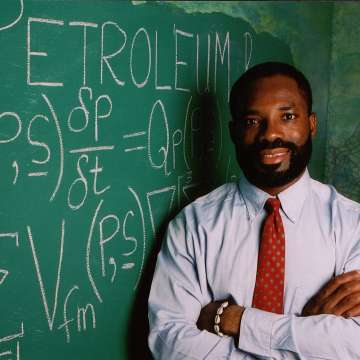

Philip Emeagwali
Philip Emeagwali is a Nigerian computer scientist. He won the 1989 Gordon Bell Prize for price-performance in high-performance computing applications, in an oil reservoir modeling calculation using a novel mathematical formulation and implementation.
Biography
Philip Emeagwali was born in Akure, Nigeria on 23 August 1954. He was raised in Onitsha in the South Eastern part of Nigeria. His early schooling was suspended in 1967 as a result of the Nigerian Civil War. At age 13, he served in the Biafran army. After the war he completed high-school equivalence through self-study.
He is married to Dale Brown Emeagwali, a noted African-American microbiologist.
Education
He traveled to the United States to study under a scholarship following completion of a correspondence course at the University of London. He received a bachelor's degree in mathematics from Oregon State University in 1977. He later moved to Washington D.C., receiving in 1986 a master's degree from George Washington University in ocean and marine engineering, and a second master's in applied mathematics from the University of Maryland. Next magazine suggested that Emeagwali claimed to have further degrees. During this time, he worked as a civil engineer at the Bureau of Land Reclamation in Wyoming.
Court case and the denial of degree
Emeagwali studied for a Ph.D. degree from the University of Michigan from 1987 through 1991. His thesis was not accepted by a committee of internal and external examiners and thus he was not awarded the degree. Emeagwali filed a court challenge, stating that the decision was a violation of his civil rights and that the university had discriminated against him in several ways because of his race. The court challenge was dismissed, as was an appeal to the Michigan state Court of Appeals.
Supercomputing
Emeagwali received the 1989 Gordon Bell Prize for an application of the CM-2 massively-parallel computer. The application used computational fluid dynamics for oil-reservoir modeling. He received a prize in "price/performance" category, with a performance figure of about 400 Mflops/$1M. The winner in the "performance" category, was also the winner of the Price/performance category, but unable to receive two prizes. Mobil Research and Thinking Machines, used the CM-2 for seismic data processing and achieved the higher ratio of 500 Mflops/$1M. The judges decided on one award per entry. His method involved each microprocessor communicating with six neighbors.
Emeagwali's simulation was the first program to apply a pseudo-time approach to reservoir modeling.
Accolades
- Price/performance–1989 Gordon Bell Prize, IEEE $1,000 prize
- New African "35th-greatest African and greatest African scientist of all time"
He was cited by Bill Clinton as an example of what Nigerians can achieve when given the opportunity and is frequently featured in popular press articles for Black History Month.
Selected publications
- Emeagwali, P. 2003. How do we reverse the brain drain. speech given at.
- Emeagwali, P. 1997. Can Nigeria leapfrog into the information age. In World Igbo Congress. New York: August.

















